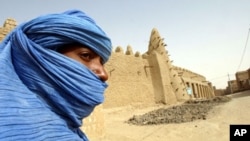DAKAR - President Blaise Compaore of Burkina Faso has begun negotiations with armed rebel and Islamist groups who seized control of northern Mali after the March 22 coup toppled the civilian government in Bamako. Compaore has been leading West African mediation efforts aimed at reuniting Mali and returning it to constitutional rule.
Burkina Faso's foreign affairs minister, Djibrill Bassole, told reporters Thursday that President Compaore is engaged in talks with militant groups in northern Mali.
Minister Bassole says the situation is delicate because of fierce rivalries between the Tuareg separatist group, the MNLA, and the militant Islamist sect, Ansar Dine, as well as the presence of two jihadist groups allied to Ansar Dine. He says this is not an easy situation to untangle, and talks are proceeding with the utmost caution to avoid aggravating tensions.
Bassole said the discussions are aimed at preserving Mali's territorial integrity, security and human rights.
Northern Mali has long been home to terrorists and traffickers. The region has been plagued by poverty, insecurity and repeated Tuareg uprisings.
Soldiers angry over the government's handling of security challenges in the north overthrew Mali's civilian leaders on March 22. Armed groups in the region seized the opportunity and quickly pushed south, effectively cutting the country in half.
The MNLA declared the territory the independent state of Azawad on April 5, while Islamist group Ansar Dine rejected independence and instead began imposing its version of Sharia law in northern towns.
Amnesty International said this week that armed groups in northern Mali are committing a number of human rights abuses that include sexual violence, extrajudicial executions and the use of child soldiers.
The Economic Community of West African States, or ECOWAS, and other international bodies say the security crisis in northern Mali threatens to destabilize the entire region. Tens of thousands of Malians have fled the violence and food insecurity in the north.
In Bamako, West African mediators continue their standoff with the military junta over the future of the transitional government.
A 40-day transition period prescribed by Mali's constitution, is set to expire Tuesday. ECOWAS wants that interim government to stay in place for one year to organize elections. The military junta says it wants to organize a national convention to elect a new interim leader. The junta did not give a timeline for the plan, and opponents criticize it as an effort by the soldiers to stay in power.
On Thursday, Burkinabe Foreign Minister Bassole, said regional mediators would reopen talks with the junta over the weekend.
Bassole says 40 days is not enough time to organize elections with two-thirds of the country occupied by armed groups. He says the government should refer the question of length of the transitional government's mandate to Mali's constitutional court.
ECOWAS is threatening to reimpose stiff economic and diplomatic sanctions if the junta continues to block efforts to restore civilian rule.
ECOWAS defense chiefs say they have begun preparations to deploy 3,000 soldiers to Mali if the transitional government requests regional intervention.
Burkina Faso's foreign affairs minister, Djibrill Bassole, told reporters Thursday that President Compaore is engaged in talks with militant groups in northern Mali.
Minister Bassole says the situation is delicate because of fierce rivalries between the Tuareg separatist group, the MNLA, and the militant Islamist sect, Ansar Dine, as well as the presence of two jihadist groups allied to Ansar Dine. He says this is not an easy situation to untangle, and talks are proceeding with the utmost caution to avoid aggravating tensions.
Bassole said the discussions are aimed at preserving Mali's territorial integrity, security and human rights.
Northern Mali has long been home to terrorists and traffickers. The region has been plagued by poverty, insecurity and repeated Tuareg uprisings.
Soldiers angry over the government's handling of security challenges in the north overthrew Mali's civilian leaders on March 22. Armed groups in the region seized the opportunity and quickly pushed south, effectively cutting the country in half.
The MNLA declared the territory the independent state of Azawad on April 5, while Islamist group Ansar Dine rejected independence and instead began imposing its version of Sharia law in northern towns.
Amnesty International said this week that armed groups in northern Mali are committing a number of human rights abuses that include sexual violence, extrajudicial executions and the use of child soldiers.
The Economic Community of West African States, or ECOWAS, and other international bodies say the security crisis in northern Mali threatens to destabilize the entire region. Tens of thousands of Malians have fled the violence and food insecurity in the north.
In Bamako, West African mediators continue their standoff with the military junta over the future of the transitional government.
A 40-day transition period prescribed by Mali's constitution, is set to expire Tuesday. ECOWAS wants that interim government to stay in place for one year to organize elections. The military junta says it wants to organize a national convention to elect a new interim leader. The junta did not give a timeline for the plan, and opponents criticize it as an effort by the soldiers to stay in power.
On Thursday, Burkinabe Foreign Minister Bassole, said regional mediators would reopen talks with the junta over the weekend.
Bassole says 40 days is not enough time to organize elections with two-thirds of the country occupied by armed groups. He says the government should refer the question of length of the transitional government's mandate to Mali's constitutional court.
ECOWAS is threatening to reimpose stiff economic and diplomatic sanctions if the junta continues to block efforts to restore civilian rule.
ECOWAS defense chiefs say they have begun preparations to deploy 3,000 soldiers to Mali if the transitional government requests regional intervention.





